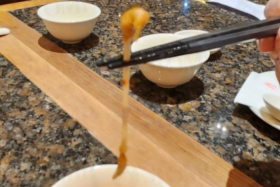Slow growth, climate change could affect rice production
Rice production needs to increase by 25 per cent over 25 years to meet demand
The production of rice, one of the world's most important crops, is facing major problems, such as slow growth and climate change, which could increase its price by more than 30 per cent by 2050.
"We need major changes to our rice and food production systems, to make them more resilient to weather disruptions, and also to reduce their emissions and their impact on the environment," said Minister for National Development Lawrence Wong yesterday.
Speaking at the opening of the International Rice Congress, he said although Singapore is a rice consumer instead of a producer, the country has turned its limited land space to its advantage by experimenting with more productive farming methods.
"After all, necessity is the mother of invention," said Mr Wong, who is also Second Minister for Finance, citing examples of urban farming producing more rice with less land.
The congress, also called the "Olympics of Rice Science", is the world's largest scientific conference on rice.
Held every four years, it is in Singapore for the first time.
This year's conference, organised by the International Rice Research Institute (IRRI) and Agri-food and Veterinary Authority, brings together 1,500 participants from 40 countries including scientists, government officials and representatives from international organisations like the United Nations' Food and Agriculture Organisation.
Among the announcements yesterday was a four-year partnership between IRRI and Corteva Agriscience, the agricultural arm of chemical giant DowDuPont, which aims to improve global rice production and quality.
According to the two bodies, rice production needs to dramatically increase by 25 per cent over the next 25 years to meet the growing demands of the world's population.
Corteva has access to seven million farmers in South and South-east Asia through its educational and outreach schemes, while IRRI has expertise in rice genetics.
Mr Peter Ford, president of Corteva Agriscience (Asia-Pacific), said: "Our shared goal for this partnership is to help rice farmers to become more productive and sustainable."
IRRI director-general Matthew Morell said Singapore's importance to international trade made it a natural choice for this year's conference: "While agriculture plays a limited role in the economy of Singapore, the country is a significant logistics and shipping hub for rice trade.
"In addition, its robust financial market and reputation for regulatory rigour positions it as an ideal location for a rice futures market that can help ensure the availability and affordability of rice worldwide."
The congress, held at Marina Bay Sands, runs until tomorrow.
Get The New Paper on your phone with the free TNP app. Download from the Apple App Store or Google Play Store now



